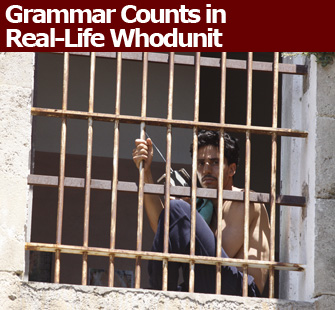
The violent murder in the Alpes-Maritime region of wealthy widow Ghislaine Marchal in June 1991 has long fascinated the French press and public. Marchal’s body was discovered in her property’s cellar, which had been barricaded from within. On the wall, written in Marchal’s blood, were the ungrammatical words “Omar m’a tuer” (Omar killed me). Based on this evidence, her illiterate Moroccan gardener, Omar Raddad, was arrested and eventually condemned to 18 years in prison, despite many worrying inconsistencies in the evidence used by the police and subsequent investigators. French President Jacques Chirac allowed Raddad to be released in 1996, but the French justice system still considers Raddad guilty of the murder.
Of movies that aim to recreate real-life events, there re those that are documentary-like in the care they take to present all sides of the argument, and there are those that make a passionate defense for the case of one side. Roschdy Zem’s new film, Omar m’a Tuer, belongs very firmly to the latter category: Raddad’s innocence is never doubted. Inspired by Raddad’s 2002 autobiographical account and by a book written by Jean-Marie Rouart, member of the Académie Française, the film follows two main characters, Omar Raddad himself, played with understated dignity by that magnificent actor Sami Bouajila, and writer Pierre-Emmanuel Vaugrenard (evidently based on Rouart, and played with dandyish charm by Denis Podalydès), who tries to prove Raddad’s innocence by uncovering the various contradictions in the evidence and recreating with his assistant (a badly underwritten role played by Salomé Stévenin) various scenarios, such as attempting to write the words “Omar m’a tuer” in pitch darkness. Somewhat disappointingly, little attempt is made to provide an alternative hypothesis other than briefly evoking the boyfriend of Marchal’s housekeeper, who was later found guilty of another murder.
Despite being so strongly on the side of the Moroccan gardener, the movie never lapses into sentimentality, and the effect is all the more devastating for it. We witness Raddad’s stoicism in prison and the pain felt by his wife (beautifully interpreted by Nozha Khoadra), and the film has moments of extraordinary simplicity and intensity: when, on Raddad’s return from prison, his young son refers to his father as “ce Monsieur” (this man), for example, or, in the final scene, when asked on a bus whether he is the famous Omar, Raddad denies it. On a visual level, too, many scenes are vividly portrayed, none more so than the vertical shot of people watching on each story of the apartment block as Raddad is led away by police officers.
Although there is a slight mismatch between Vaugrenard’s almost farcical efforts to recreate the facts of the case and the tragedy of Raddad’s plight, Zem has created a movie that is both tender and memorable, concluding with a shot of Raddad as he is now, still striving to prove his innocence.
Favorite